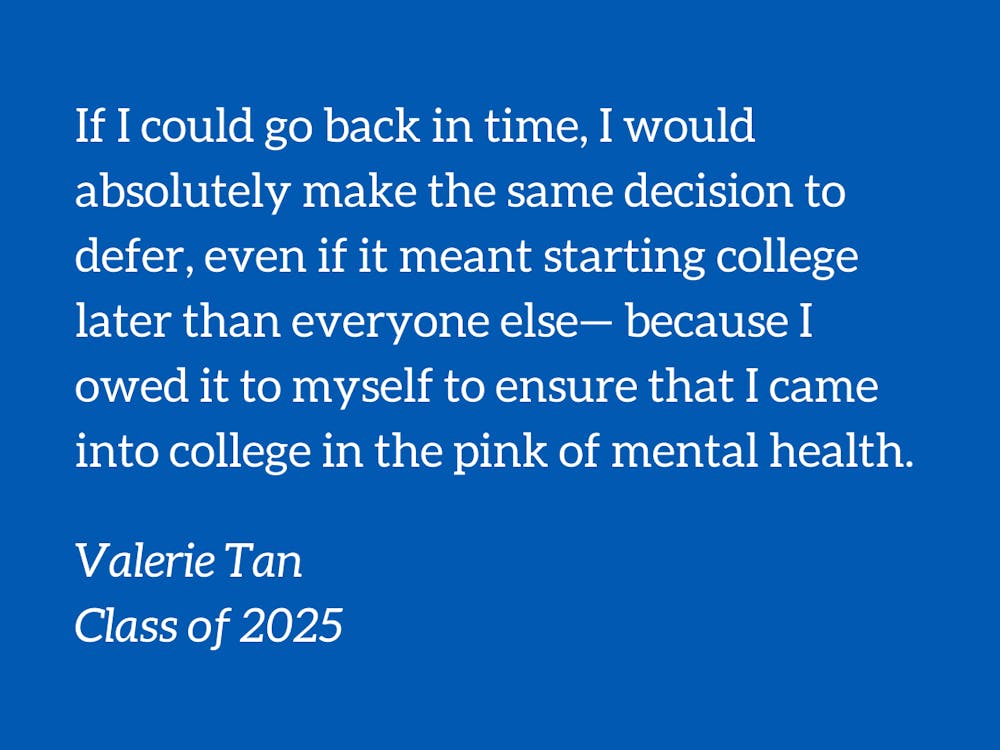A gap year sounds sexy, doesn’t it? It’s becoming increasingly popular, but still unconventional enough to warrant fascination from others when you tell them about it. It's a badge of honor you wear proudly on your sleeve to announce to the world that you are not afraid to stop and take time to think about what you truly want to do in life, even as your peers relentlessly forge ahead in their educational and professional pursuits.
Everyone takes a gap year for different reasons. Some do so to travel or recharge after high school, others to gain working experience, ascertain aspirations, discover new passions or, in my case, to avoid virtual schooling during a pandemic. More often than not there are a multitude of factors at play, but we all share a common goal–to feel more prepared for college and life at large.
My gap year certainly boosted my academic readiness for college, but more than that, my mental health benefited in ways that I would not have expected a year ago.
My career aspirations underwent a shift in the last year, largely due to my biotech internship and research attachment—I was inspired to divert away from public health policy formulations towards the physician-scientist pathway. With extra time on my hands, I had the luxury of exploring the plethora of resources offered at Duke, talking to seniors and observing some classes related to my prospective majors (owing to the generosity of many professors). I now have a clearer idea of which courses to take, which programs to participate in and which clubs to join.
But the most useful skill I acquired was the art of self-care. Bouts of ill health caused me to realize how much I had been neglecting my body and mind over the past few years. They prompted me to re-examine my lifestyle and reorganize my priorities, to stop centering my life around work and school and define boundaries to ensure that my physical and mental well-being are not encroached upon.
I probably should have established this work-life balance way back in high school, but in hindsight, I don’t blame myself for not doing so. How could I, with my future seemingly hanging in the balance? Not to mention, I based my self-worth largely on my academic and extracurricular achievements and felt addicted to the satisfaction of perfecting a test score or winning a competition.
Extricating myself from the formal schooling system was necessary for this entrenched mindset to change. Life felt empty initially without the extrinsic gratification of a good score. But I soon discovered healthier, more sustainable sources of happiness. Who knew that taking morning strolls in the park, with the sweet scent of dewy grass still lingering heavily in the air, could dramatically uplift my mood for the rest of the day? Sometimes, I even stopped by the beach to bury secret Korean messages in the sand, wondering if anyone would discover them before they were erased by the lapping waves. Stimulated by a surge of rekindled musical passion and the addictive satisfaction of mastering a challenging song, I started playing the piano again and developed a new obsession with the ukulele (after numb fingertips and painful calluses suspended my love affair with the guitar). Every happy memory I make now is carefully preserved in daily gratitude stories on Instagram that remind me to savor all the little pleasures in my life before they slip away without warning.
I still see it as a form of responsibility to do well in tests, examinations and projects, but they no longer tower over me like mammoth specters. Receiving a mediocre grade will not make or break my college experience, let alone my life, and reducing my existence to a couple of numbers and letters is, well, depressing to say the least.
Preparing for the AP Biology test in May gave me a chance to put this new mindset into practice, like a rehearsal before the actual college stage. While my high school self would have spent every possible minute cooped up in my study room, save for occasional trips to the bathroom or kitchen, the “new me” interspersed study periods with piano practice sessions, k-drama breaks and evening walks, even having the audacity to meet my friends for a meal or two. Rather than undermining my preparedness for the test, these healthy distractions actually alleviated my long-standing performance anxiety and prevented me from burning out (as I did while preparing for the “A” Levels).
Over the past year, I definitely grew in both tangible and intangible ways. If I could go back in time, I would absolutely make the same decision to defer, even if it meant starting college later than everyone else—because I owed it to myself to ensure that I came into college in the pink of mental health. That being said, taking a gap year is far from a panacea; you shouldn’t feel pressured to get it all figured out within 365 days. Exploration is, after all, what college is all about. I do have more clarity around my aspirations and passions, but it is with an open mind that I am stepping into college, where new peers, mentors and experiences are constantly shaping me in hitherto unimaginable ways.
Valerie Tan is a Pratt first-year. Her column runs on alternate Fridays.
Get The Chronicle straight to your inbox
Signup for our weekly newsletter. Cancel at any time.
Valerie Tan is a Pratt junior and an opinion managing editor of The Chronicle's 119th volume.

